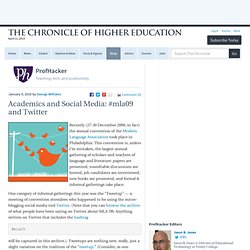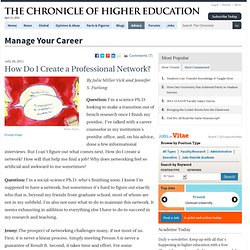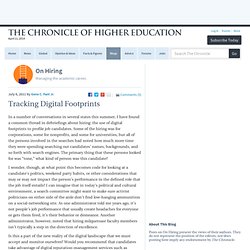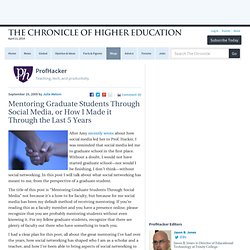

Academics and Social Media: #mla09 and Twitter. Recently (27-30 December 2009, in fact) the annual convention of the Modern Language Association took place in Philadelphia.

This convention is, unless I’m mistaken, the largest annual gathering of scholars and teachers of language and literature: papers are presented, roundtable discussions are hosted, job candidates are interviewed, new books are promoted, and formal & informal gatherings take place. One category of informal gatherings this year was the “Tweetup” — a meeting of convention attendees who happened to be using the micro-blogging social media tool Twitter. (Note that you can browse the archive of what people have been saying on Twitter about MLA ‘09. Anything written on Twitter that includes the hashtag #mla09 will be captured in this archive.). The MLA Tweetup was covered by Inside Higher Ed in a story that concluded with these thoughts from Philip Lewis, vice president of the Andrew W. What follows are the responses we received. Anonymous #1 Anonymous #2 Ryan Cordell.
How Do I Create a Professional Network? - Manage Your Career. By Julie Miller Vick and Jennifer S.

Furlong Question: I'm a science Ph.D. looking to make a transition out of bench research once I finish my postdoc. I've talked with a career counselor in my institution's postdoc office, and, on his advice, done a few informational interviews. But I can't figure out what comes next. How do I create a network? Question: I'm a social-science Ph.D. who's finishing soon. Jenny: The prospect of networking challenges many, if not most of us.
Julie: I, on the other hand, enjoy networking and do it regularly on behalf of the students I serve, my own kids, and, sometimes, myself. Jenny: Our first reader mentions informational interviews as a way to jump-start your network. Julie: Informational interviewing takes effort and, most important, patience. But building a network takes time, especially if you're starting from scratch in a new field. Jenny: It's keeping people updated on your progress that often challenges job seekers and network builders alike. Academics and social media: ymmv. My Daily Read: Marc Lynch - PageView. On Hiring. In a number of conversations in several states this summer, I have found a common thread in debriefings about hiring: the use of digital footprints to profile job candidates.

Some of the hiring was for corporations, some for nonprofits, and some for universities, but all of the persons involved in the searches had noted how much more time they were spending searching out candidates’ names, backgrounds, and so forth with search engines. The primary thing that these persons looked for was “tone,” what kind of person was this candidate? I wonder, though, at what point this becomes code for looking at a candidate’s politics, weekend party habits, or other considerations that may or may not impact the person’s performance in the defined role that the job itself entails? I can imagine that in today’s political and cultural environment, a search committee might want to make sure activist politicians on either side of the aisle don’t find low-hanging ammunition on a social-networking site. ProfHacker. After Amy recently wrote about how social media led her to Prof.

Hacker, I was reminded that social media led me to graduate school in the first place. Without a doubt, I would not have started graduate school—nor would I be finishing, I don’t think—without social networking. In this post I will talk about what social networking has meant to me, from the perspective of a graduate student. The title of this post is “Mentoring Graduate Students Through Social Media” not because it’s a how-to for faculty, but because for me social media has been my default method of receiving mentoring.
If you’re reading this as a faculty member and you have a presence online, please recognize that you are probably mentoring students without even knowing it. I am (and always have been) a non-traditional student. In the narrative above, the point at which I realized I still loved English coincided with the point at which I started blogging: April 2004. I learned a lot through observation.